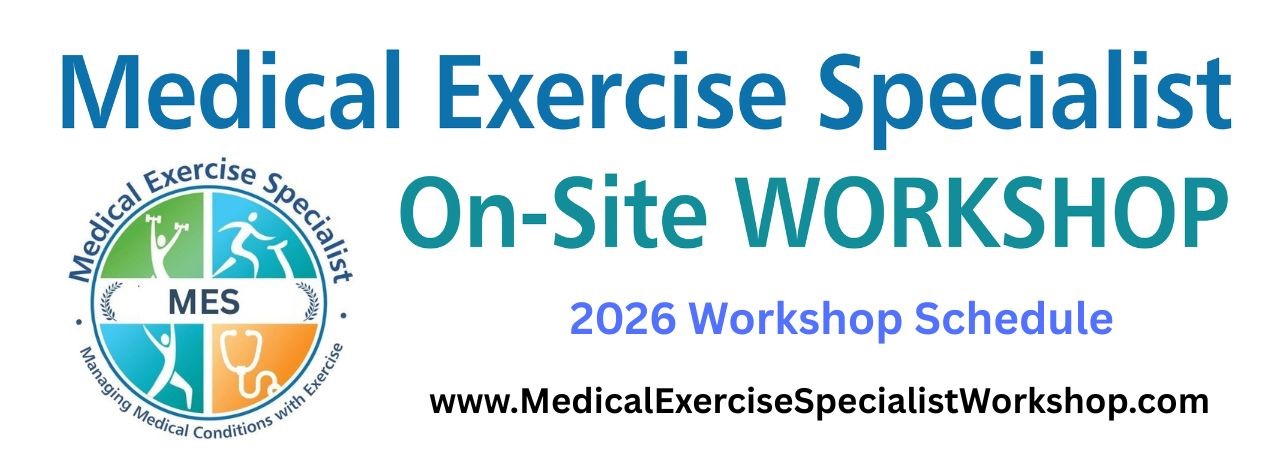MedExPRO....Are You Actually Referral and Reimbursement-Ready? Complete the Checklist
Hello MedExPRO,
Let me ask you a direct question.
Do you believe your practice is referral-ready?
Do you believe you are reimbursement-ready?
Most Medical Exercise Professionals think they are.
You manage complex clients.
You understand pathology.
You care deeply about safety.
You communicate professionally.
But here is the uncomfortable truth:
Good intentions and strong exercise knowledge do not make a practice referral-ready or reimbursement-ready.
Systems do.
Why This Matters (And Why Most Don’t Realize They’re Not Ready)
Most MedExPROs fear three things:
- Approaching physicians and being dismissed
- Talking about reimbursement and saying the wrong thing
- Accidentally stepping outside scope
So what do they do?
They avoid the conversation.
They hope referrals will “just happen.”
They tell clients, “You can try to submit this,” without structured documentation.
And they quietly wonder why medical professionals don’t consistently refer.
That is not a competence problem...
What It Means to Be Reimbursement-Ready—and How It Elevated Sarah’s Practice

Reimbursement-ready does not mean billing insurance.
It means your practice has the documentation, language, and systems to support a client who chooses to pursue reimbursement.
Before the MES Enterprise Cohort, Sarah avoided these conversations.
After the cohort, she handled them with confidence.
What “Reimbursement-Ready” Means for a MedExPRO
A reimbursement-ready practice has:
- A proper medical referral
- Written by a licensed provider
- Specifies Medical Exercise Training or Functional Conditioning
- Includes a diagnosis and ICD-10 code
- Consistent session documentation
- Date, duration, and service description
- Functional focus tied to the diagnosis
- Objective indicators of progress
- Client-ready documentation
- Session summaries
- Progress reports
- Clear service descriptions appropriate for submission
Reimbursement-ready practices do not promise payment.
They provide professional clarity.
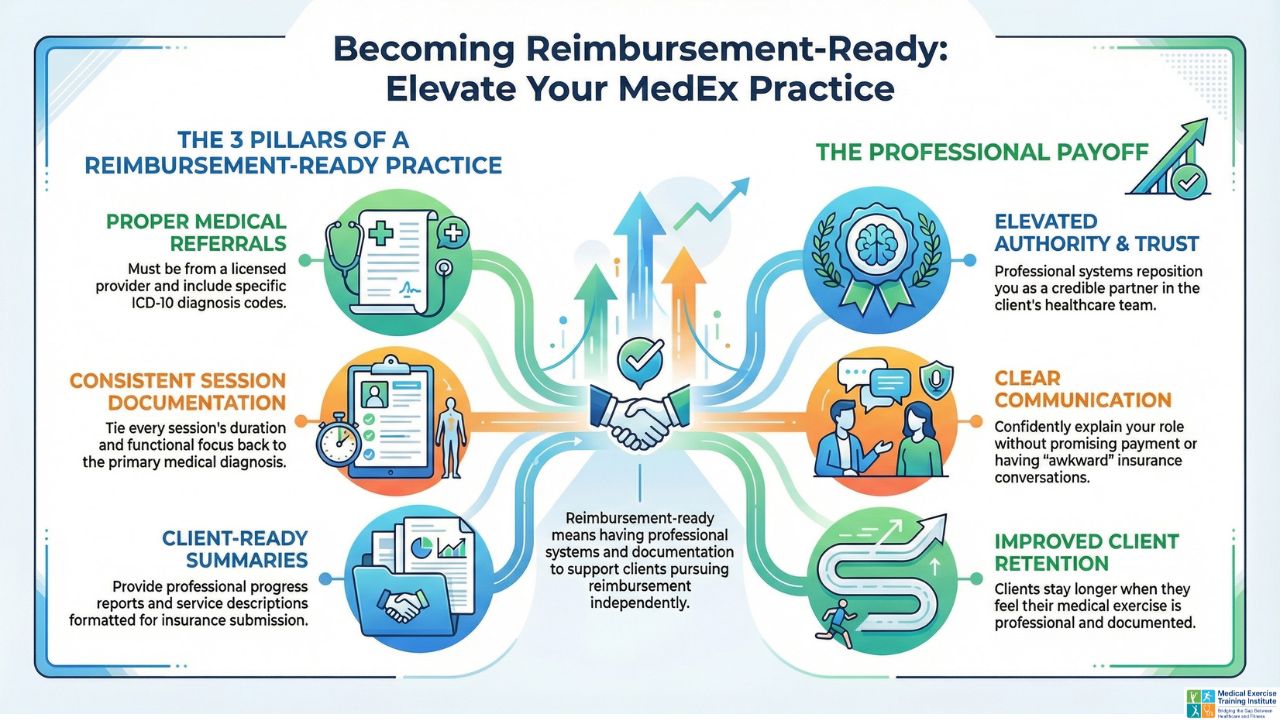
Why Reimbursement-Ready Changed Sarah’s Practice
Once Sarah became reimb...
Medical Exercise Professionals Are Expected to Have These Skills...Do You??
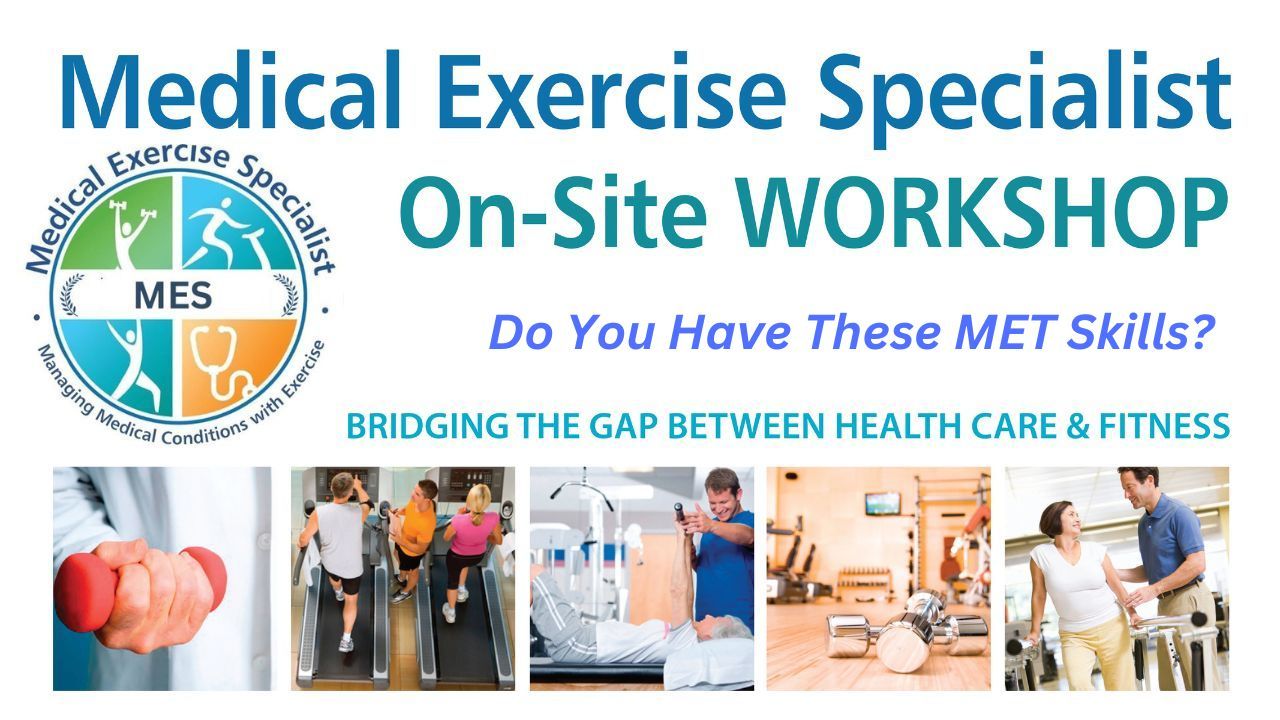
Most fitness and post-rehab professionals believe they are “working with medical clients.”
Very few can document the skills required to do so safely, ethically, and professionally.
That gap is exactly why the Medical Exercise Specialist (MES) On-Site Workshop exists.
The Reality of Medical Exercise Practice
Medical exercise is not defined by enthusiasm, experience, or certifications alone. It is defined by demonstrable competencies—the kind medical professionals assume you already possess when they trust you with a referred client.
The Medical Exercise Skills Checklist outlines more than 50 core competencies that a Medical Exercise Professional should be able to perform independently, confidently, and consistently. These are not “advanced” skills. They are baseline expectations in medical environments. Yet most professionals have never been formally trained in many of them.
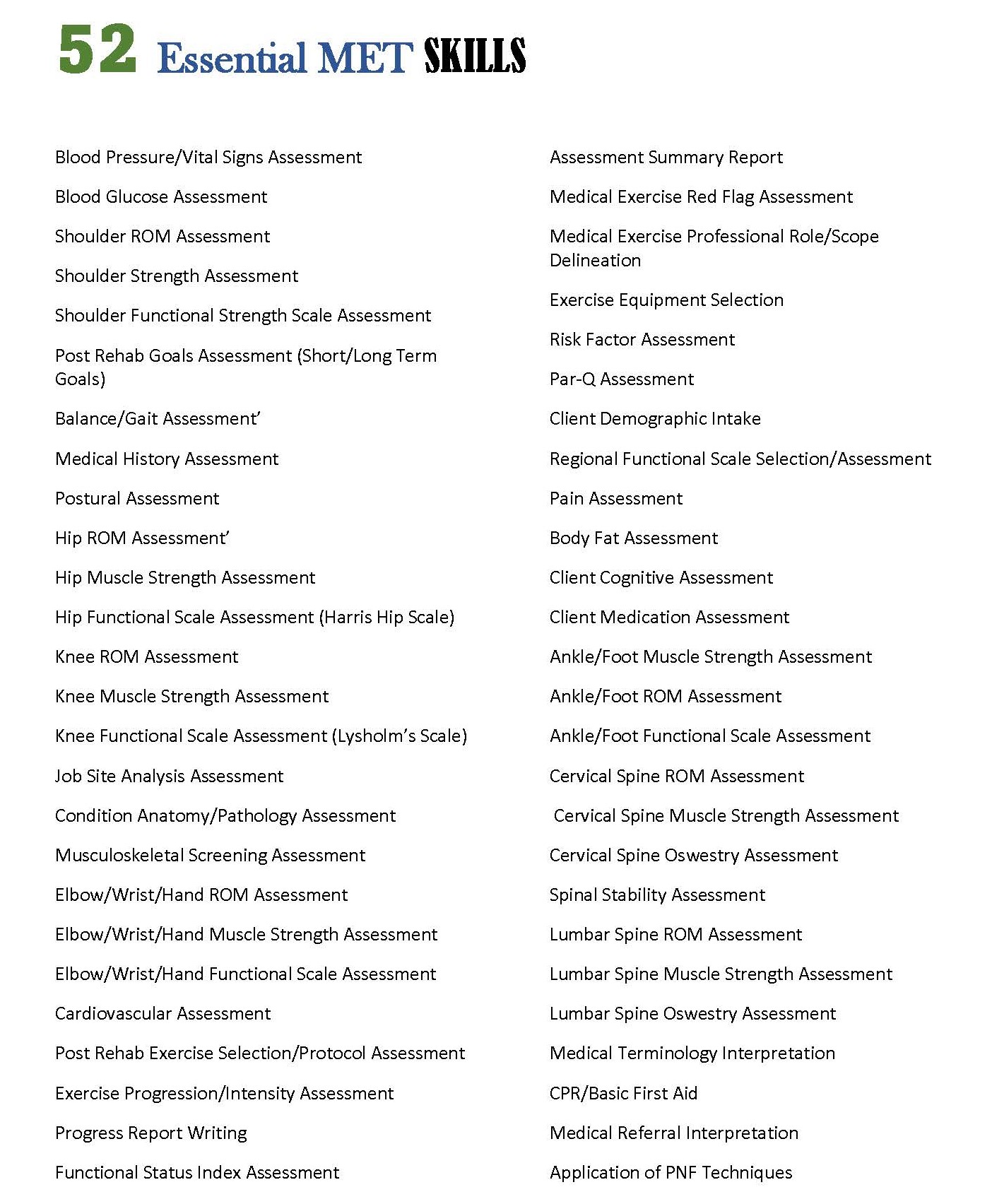
What the Skills Checklist Really Reveals
When professionals review this checklist honestly, a pattern em...
MET 101 eBook Tip 47: Managing Blood Pressure and Blood Glucose in MET
One of the most common—and unnecessary—sources of anxiety for Medical Exercise Professionals is knowing when it is safe to exercise a client with hypertension or diabetes. This uncertainty often leads to hesitation, avoidance, or overly conservative programming that limits outcomes.
Here’s the truth: medical providers expect and respect these conversations.
Physicians would much rather answer a clear, professional question about exercise parameters than discover later that decisions were made without guidance. Reaching out to clarify acceptable blood pressure or blood glucose ranges does not signal inexperience—it demonstrates professionalism, risk awareness, and respect for scope.
Every MedExPRO should begin a new client relationship by:
- Obtaining a written referral
- Confirming the diagnosis and ICD-10 code
- Requesting individualized exercise parameters for blood pressure and/or blood glucose
That said, there are general safety thresholds every MedExPRO must understand and be...
Medical Exercise Specialist Workshop 2026 Schedule - 2-Day Intensive
SCROLL TO BOTTOM TO REGISTER
| 🎯 Only 12 Seats | 🚨 2026 Workshop Schedule
⏱️ Stop Guessing. Start Bridging the Gap Between Healthcare & Fitness.
The Medical Exercise Specialist Workshop gives you the skills, systems, and credibility to manage medical clients, attract physician referrals, and grow a sustainable practice.
The Challenges Every MedExPRO Feels
If you’ve been in the fitness or rehab field for any length of time, you’ve probably felt these frustrations:
❌ You’re confident training healthy clients… but nervous with complex cases. When a client walks in with diabetes, osteoarthritis, or post-surgery clearance, do you find yourself second-guessing your program design?
⚠️ You’ve taken certifications… but still don’t have referrals. Too many MedExPROs think another certification will open doors — but doctors don’t care about your wall of certificates. They care about results, documentation, and professionalism.
😖 You want physician referrals… but don’t know what to say. Do y...
10 Reasons MedExPROs Struggle to Build Sustainable Practices
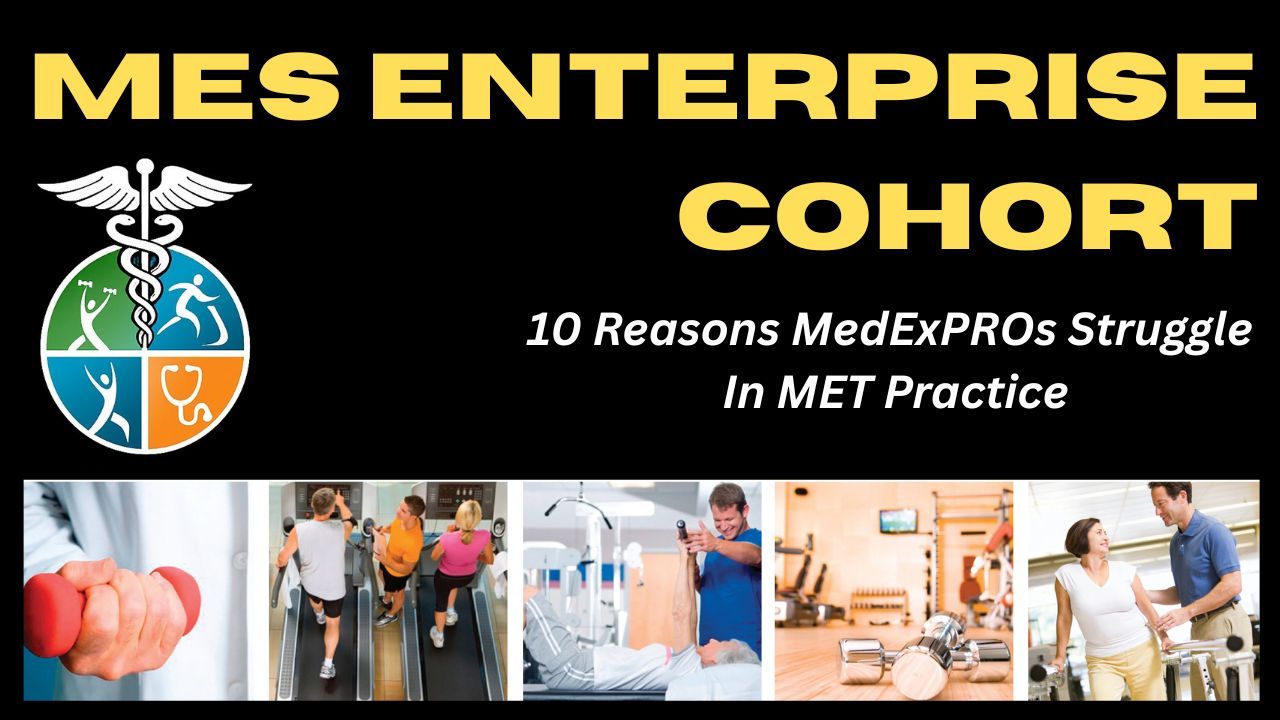
Why Skill Alone Is Never Enough?
Over the last 32 years, I’ve had the privilege of educating thousands of Medical Exercise Professionals around the world. I’ve seen exceptional clinicians. I’ve seen deeply committed professionals. I’ve seen individuals who truly change lives through exercise.
And yet—despite their knowledge, passion, and skill—many of those same professionals struggle to build sustainable, profitable medical exercise practices.
This isn’t because they don’t care.
It isn’t because they aren’t competent.
And it certainly isn’t because medical exercise “doesn’t work.”
It’s because medical exercise success is not a skills problem.
It’s a practice-development problem.
Over three decades, the same issues appear again and again. Different cities. Different countries. Different certifications. Same outcomes.
Below are the 10 most common reasons Medical Exercise Professionals struggle to build strong practices—and how those problems are directly addressed inside the MES E...
5 MES AI Prompts Every MedExPRO Needs to Build a Referral-Ready Practice in 90 Days
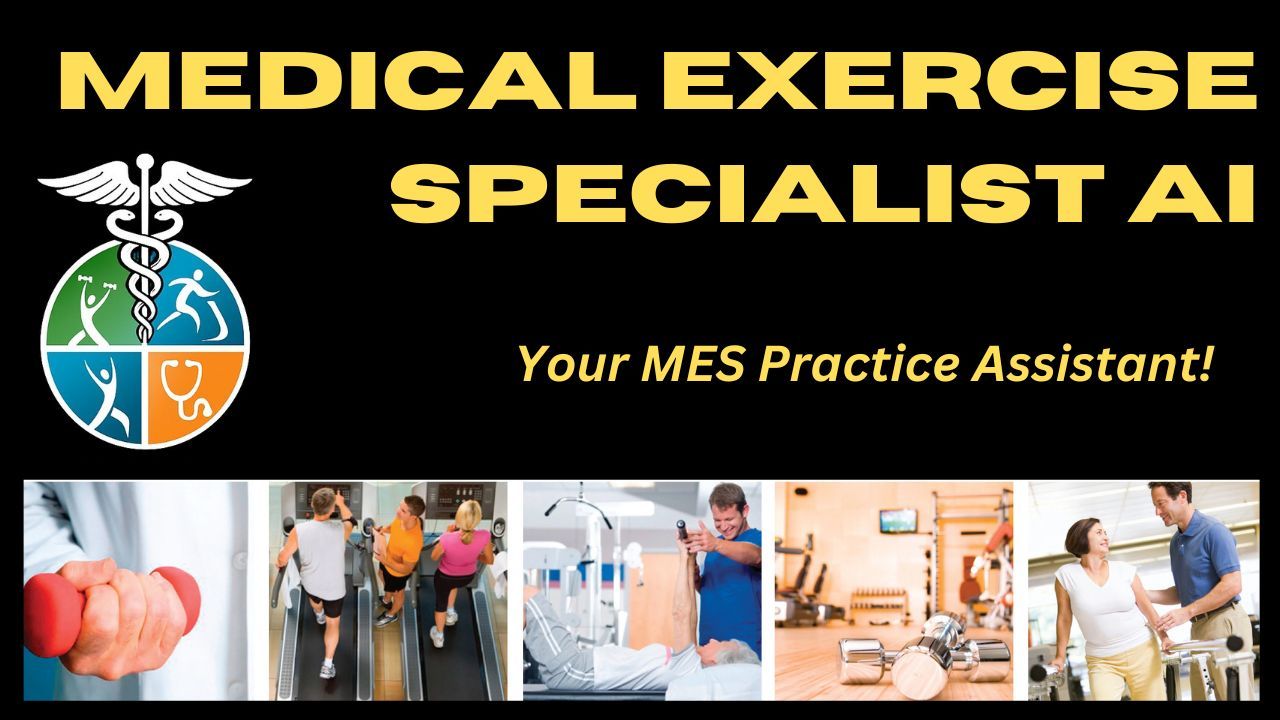
Every MedExPRO Needs an AI Practice Assistant—Not Another Certification
Medical Exercise Training is not about workouts.
It is about systems, standards, communication, and outcomes.
And yet, most Medical Exercise Professionals are still trying to operate like healthcare-adjacent professionals without healthcare-adjacent infrastructure.
That’s not a motivation problem.
That’s a systems problem.
Most MedExPROs don’t struggle because they lack exercise knowledge. They struggle because they are expected to:
- Think like a professional
- Document like a professional
- Communicate like a professional
- Market like a professional
- And manage risk like a professional
…all while working alone, without structured guidance.
That gap is exactly why MES AI exists .
MES AI Is Not “ChatGPT for Fitness”
Let’s be clear.
MES AI is not:
- A workout generator
- A diagnostic tool
- A treatment engine
- Or a generic AI chatbot
MES AI is a scope-safe AI Practice Assistant, built on more than 30 ye...
MET 101 eBook Tip 46 - Expensive Equipment Won’t Make You Good
Equipping Your Medical Exercise Practice: Functionality Over Flash
One of the most common—and most misunderstood—questions Medical Exercise Professionals ask is:
“What equipment do I need to offer medical exercise services?”
The better question is this:
“What equipment supports safe progression, risk management, and functional outcomes for medically referred clients?”
In Tip 46 of the MET 101 series, the message is clear:
Your practice is not defined by high-tech equipment—it is defined by your clinical reasoning and how you apply exercise to medical conditions.
The most important “tools” in your facility are not machines. They are:
- Your understanding of clinical anatomy
- Your working knowledge of pathology
- Your ability to apply exercise within medical boundaries
- Your skill in communicating with referring providers
Equipment supports those skills—it does not replace them.
🧠 Before Equipment, Your Practice Must Have These Foundations
Regardless of facility size, every pr...
Your 2026 Medical Exercise Practice Success Begins TODAY!!
Your Medical Exercise Practice in 2026 Will Not Improve by Accident
It Improves When You Install the Right Systems
Hello MedExPRO,
As this year closes, I want you to pause—not to dwell on what didn’t happen in 2025—but to make a deliberate decision about what will happen in 2026.
Because here’s the truth most Medical Exercise Professionals quietly carry:
You know how to train.
You care deeply about your clients.
You show up consistently.
Yet you still:
- hesitate before documenting
- second-guess what to say to physicians
- avoid outreach because you’re unsure how you’ll be received
- feel pressure every time income slows
- wonder if you’re “missing something” other professionals seem to have
That doesn’t mean you lack ability.
It means you’ve been operating without a complete professional system.
And in 2026, that gap matters more than ever.
Medical Exercise Opportunities Are Real — But Only for Prepared Professionals
Medical Exercise Training opportunities are expanding:
-
...
MedExPROs Keep The Revenue Flowing During the Holidays

Holiday Revenue Strategy: The MedExPRO Quick Cash Flow 7-Day Checklist
The Christmas and year-end holidays often lead to paused schedules, cancelled sessions, and delayed client rescheduling. That slowdown is normal—but it doesn’t have to mean stalled revenue.
The MedExPRO Quick Cash Flow 7-Day Checklist was designed as a strategic revenue bridge—a focused, professional way to generate income and momentum during periods when regular training sessions temporarily slow.
Rather than relying on ongoing weekly sessions, this checklist helps MedExPROs:
-
create short-term revenue opportunities that don’t depend on full client schedules
-
engage post-discharge clients and community groups who remain active during the holidays
-
strengthen referral credibility so January begins with momentum—not a cold start
In just seven structured days, the checklist outlines how to:
-
onboard new clients through post-discharge and community-based services
-
demonstrate professional do
...

